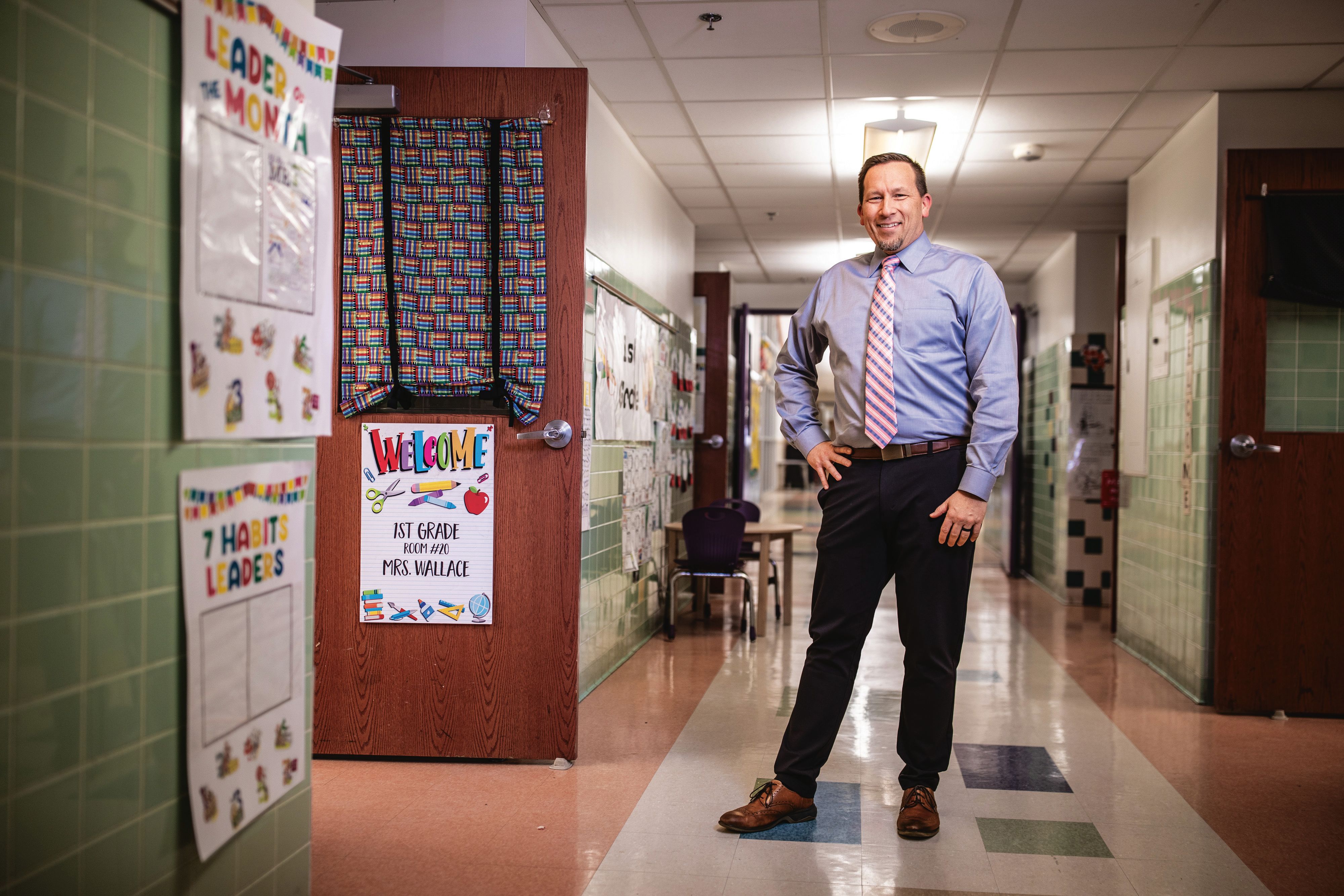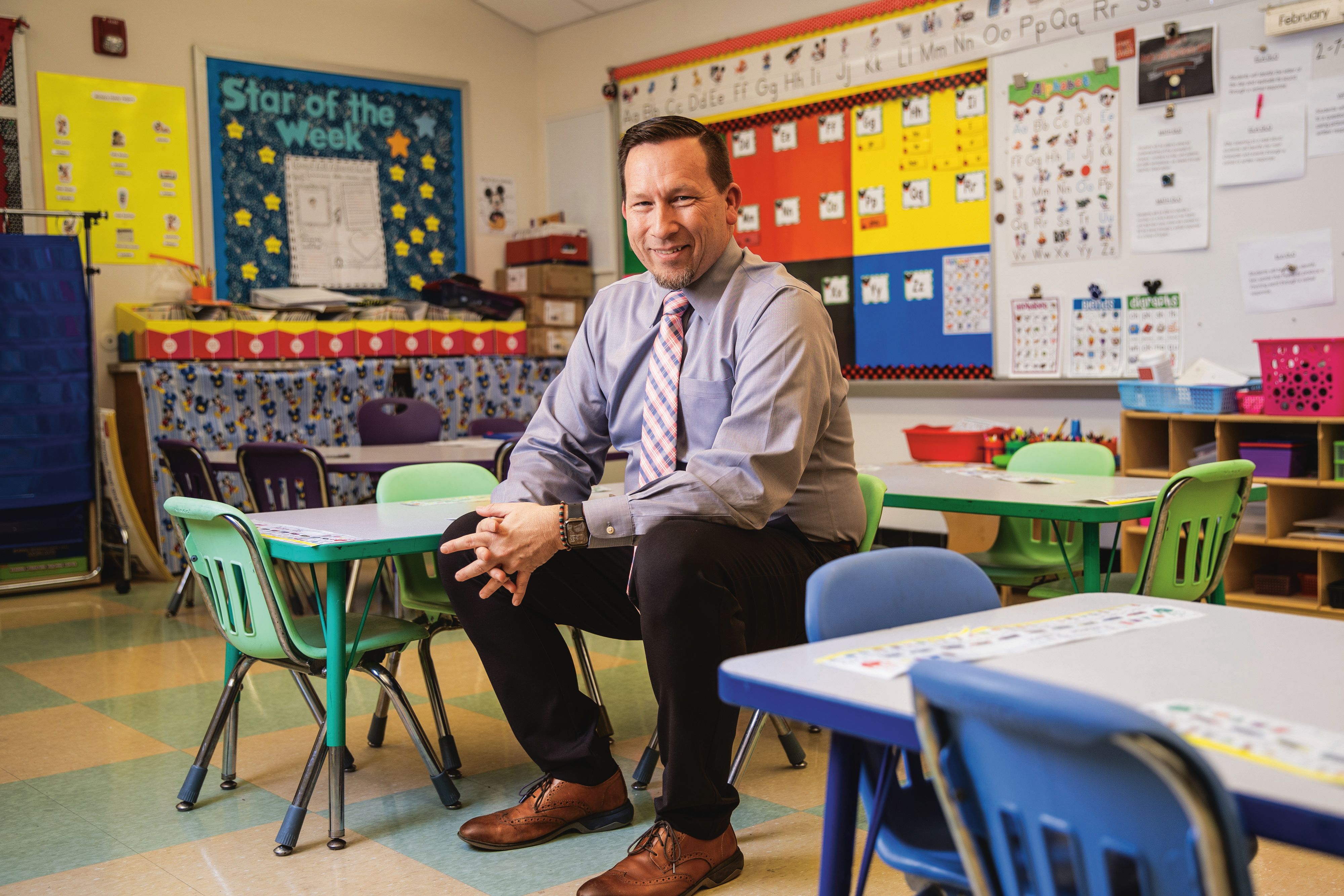CLOSE-UP: A PATIENT'S PERSPECTIVE
PRINCIPAL GETS SCHOOLED ON
MALE BREAST CANCER

When Lanny Blair showed up for his appointments at the start of his cancer journey, the people checking him in would often address their questions and comments to his wife, Kim. This confusion was due to the fact that Blair is one of the less than 1% of men who are diagnosed with breast cancer.
“Everywhere I went, all of the paperwork was focused towards women,” said Blair, who is 51. “It asked questions like, ‘When was your last menstrual cycle?’ or ‘Could you be pregnant?’ There were frequently only ever pink gowns when I went in for an appointment.”
When he tried to learn more about male breast cancer on the internet, a lot of the available in-formation was for men diagnosed with breast cancer in their late 60s, Blair said. He felt a bit lost and didn’t know where to turn.
Born and raised in San Diego, Blair now lives outside Philadelphia with his wife and two daughters. He has been an educator for 27 years and is currently the principal of an elementary school in Delaware. In some of his free time, he coaches one of his daughter’s soccer teams.
“Everywhere I went, all of the paperwork was focused towards women. It asked questions like, ‘When was your last menstrual cycle?’ or ‘Could you be pregnant?’ There were frequently only ever pink gowns when I went in for an appointment.”
“It was while I was coaching that I first noticed a painful lump in my chest,” Blair said. “I ignored it, figuring it would go away in a couple of weeks.”
A few weeks turned into almost two months, and Blair knew it was time to get it checked out. Although it is uncommon in males, Blair’s primary care physician wanted to screen him for breast cancer.
Blair had his first diagnostic mammogram in January of 2019, followed by an ultrasound. Two days later he was asked to come back for a biopsy. A week later, he was given a diagnosis: invasive ductal carcinoma of the breast.
When he received the diagnosis, Blair sat down and cried. He had just lost a cousin to pancreatic cancer and both of his grandfathers had died of cancer, one of colon cancer and the other of prostate cancer. A few other relatives died of cancer too.
“With all those other cancer deaths in my family, I thought, ‘What does that mean for me?’” Blair said.
He sought out three opinions on his diagnosis, but he knew he had found the physician for the job when he met with surgical oncologist Richard J. Bleicher at Fox Chase Cancer Center. Unlike the first two physicians he visited, who treated maybe one male breast cancer case a year, Bleicher had treated nine men with the disease in the past two years and many more over the course of his career.

CARDONI
“Fox Chase was over an hour away from where I live. There were two more convenient places for me to seek treatment, but I felt really comfortable going to Dr. Bleicher. He knew the re-search inside and out,” Blair said.
Because it is so rare, guidelines recommend that males diagnosed with breast cancer undergo genetic testing.
“Out of the 23 cancer markers they looked at, everything came back negative, which was shocking given all of the deaths in my family,” Blair said. “This was great news to me because it meant that whatever I had, I would not pass it on to my girls.”
Blair underwent his first lumpectomy in February of 2019 and underwent a second in March to clear out more of the tissue surrounding the tumor site. Blair said he only missed a few days of work during the surgery and was back at school the following week.
After healing from the surgeries, he underwent 25 rounds of radiation therapy with Stephanie Weiss, a radiation oncologist at Fox Chase.
“I am in a survivors’ clinic now,” Blair said. “I am four and a half years past my surgery and radiation and things are going fine.”
Regular follow-up remains important. “I get my annual mammograms and visit my surgical oncologist and medical oncologist once a year.” Blair said he had a small scare recently when he felt a painful lump in his chest, but imaging showed that it was just scar tissue.
He added that he has not experienced much social stigma surrounding his diagnosis and encourages other men with breast cancer not to feel embarrassed because he has received so much support.
“In the years since my diagnosis, I’ve had three female colleagues that got tested, found breast cancer, and underwent treatment,” Blair said. “They said my diagnosis was a wake-up call for them to go get checked.”
If something doesn’t feel right, Blair added, don’t wait. Don’t ignore it. Get it checked out.